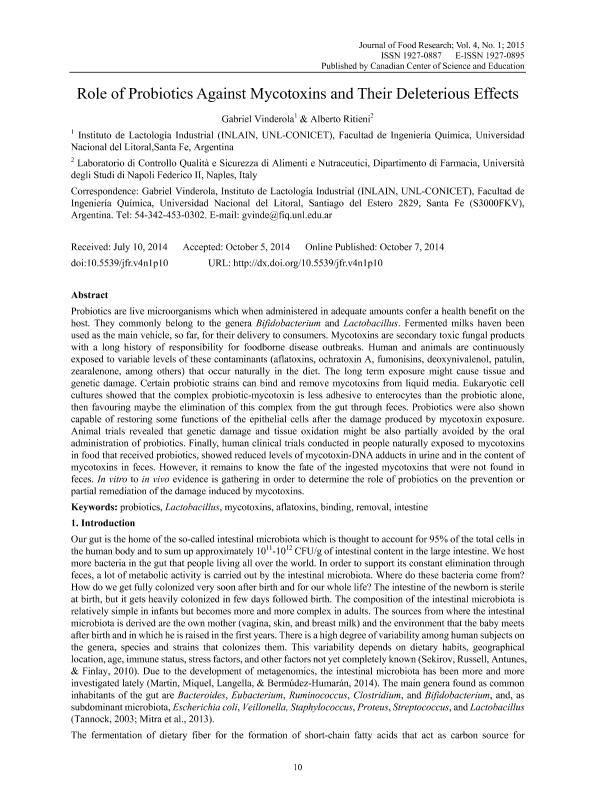Artículo
Role of Probiotics Against Mycotoxins and Their Deleterious Effects
Fecha de publicación:
10/2014
Editorial:
Wiley VCH Verlag
Revista:
Journal of Food Research
ISSN:
1927-0887
Idioma:
Inglés
Tipo de recurso:
Artículo publicado
Clasificación temática:
Resumen
Probiotics are live microorganisms which when administered in adequate amounts confer a health benefit on the host. They commonly belong to the genera Bifidobacterium and Lactobacillus. Fermented milks haven been used as the main vehicle, so far, for their delivery to consumers. Mycotoxins are secondary toxic fungal products with a long history of responsibility for foodborne disease outbreaks. Human and animals are continuously exposed to variable levels of these contaminants (aflatoxins, ochratoxin A, fumonisins, deoxynivalenol, patulin, zearalenone, among others) that occur naturally in the diet. The long term exposure might cause tissue and genetic damage. Certain probiotic strains can bind and remove mycotoxins from liquid media. Eukaryotic cell cultures showed that the complex probiotic-mycotoxin is less adhesive to enterocytes than the probiotic alone, then favouring maybe the elimination of this complex from the gut through feces. Probiotics were also shown capable of restoring some functions of the epithelial cells after the damage produced by mycotoxin exposure. Animal trials revealed that genetic damage and tissue oxidation might be also partially avoided by the oral administration of probiotics. Finally, human clinical trials conducted in people naturally exposed to mycotoxins in food that received probiotics, showed reduced levels of mycotoxin-DNA adducts in urine and in the content of mycotoxins in feces. However, it remains to know the fate of the ingested mycotoxins that were not found in feces. In vitro to in vivo evidence is gathering in order to determine the role of probiotics on the prevention or partial remediation of the damage induced by mycotoxins.
Palabras clave:
Mycotoxin
,
Food
,
Probiotics
,
Removal
Archivos asociados
Licencia
Identificadores
Colecciones
Articulos(INLAIN)
Articulos de INST.DE LACTOLOGIA INDUSTRIAL
Articulos de INST.DE LACTOLOGIA INDUSTRIAL
Citación
Vinderola, Celso Gabriel; Ritieni, Alberto; Role of Probiotics Against Mycotoxins and Their Deleterious Effects; Wiley VCH Verlag; Journal of Food Research; 4; 10-2014; 10-21
Compartir
Altmétricas




